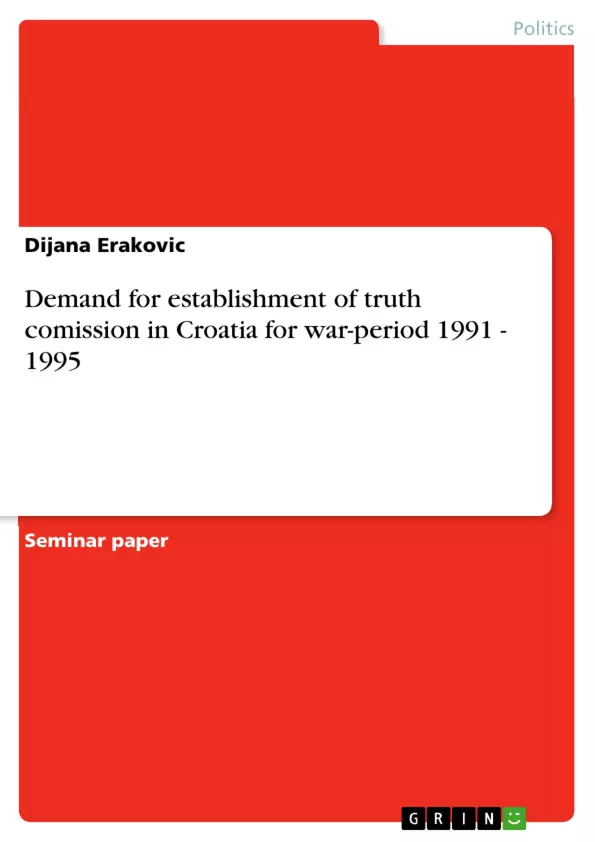P. Hayner recommends truth commission establishment after the conflict, but in the case of Croatia I believe that this is the best period for it, although 15 years after, because tensions are decreased, criminal justice (ICTY) failed in reconciliation of two groups, diplomatic relations between Croatia and Serbia are on satisfactory level, number of returned Serbs is also sufficient (although still too high number of Croatian Serbs is abroad) to have a successful dialogue through truth commission’s work.
Same author permits that every truth commission can be unique in a sense to be adjusted to specific context of particular country. In case of Croatia, I think truth commission should be common project with Serbia because Serbia is partly responsible directly for the conflict through its paramilitary units’ and organized criminal groups’ crimes, direct conflict on the border in Eastern Slavonia and ideological manipulation with Croatian Serbs. Serbia also has the highest number of refugees from Croatia. One of the aims of truth commission should be reconciliation with Serbia, but the most important aim should be reconciliation between Croats and Croatian Serbs, so in that respect my idea differs from REKOM initiative which wants to cover three ex-Yugoslav republics. Related with Dimitrijevic’s idea, I agree that Serbia should establish a new truth commission, but in respect to Croatian-Serbian conflict, Serbia does not need to deal with it alone. For now, I have doubts should B&H be included for now because that state has serious internal cleavages and I perceive it as a time bomb.
I think that one of the main messages to Croatian Serbs, and to both nations – Serbians and Croats, should be that Croatia is their native land in which they lived for centuries, where they belong and where they are welcomed to come back. Every ideology (whether Croatian or Serbian), which would undermine it, should be condemned by both sides officially. Also, I think that end of truth commission’s work should be marked with highly symbolic and emotional rituals, celebrations and gestures. I think it would be very powerful if new national holiday is established, called Reconciliation Day, on which every year both sides will remember what happened between them and express each other a promise that it will never happen again.
Inhaltsverzeichnis (Table of Contents)
- Why truth commission?
- Truth commissions as a mechanism for transitional justice
- Croatian-Serbian conflict and its consequences
- Public opinion and the potential for reconciliation
- REKOM, ICTY, and the Serbian experience with truth commissions
- Croatian Serbs and Croatian-Serbian conflict
- Facing with the past and the truth
- Is reconciliation possible?
- Pre-war "mixed" families, friendships and marriages as a social capital
- REKOM..
- ICTY and Croatian public opinion ......
- Truth Commission in Serbia.......
- Final comment..
Zielsetzung und Themenschwerpunkte (Objectives and Key Themes)
This paper argues for the establishment of a truth commission in Croatia to investigate crimes committed during the Croatian-Serbian conflict of the 1990s. It draws on the proposal of a similar commission in Serbia, using international scholarship on transitional justice and public opinion surveys to support its claims.
- The role of truth commissions in transitional justice
- The Croatian-Serbian conflict and its lasting impact
- The potential for reconciliation between Croats and Croatian Serbs
- The importance of public opinion in supporting truth commissions
- Lessons learned from past experiences with truth commissions in Serbia
Zusammenfassung der Kapitel (Chapter Summaries)
- Why truth commission?: This chapter introduces the concept of truth commissions as a mechanism for transitional justice and explores their relevance in the context of the Croatian-Serbian conflict. It examines the work of the South African Truth Commission and highlights the importance of impartiality, independence, and public access in ensuring the effectiveness of such commissions.
- Croatian Serbs and Croatian-Serbian conflict: This section provides a brief overview of the Croatian-Serbian conflict, focusing on the consequences of the conflict and the historical and political context that contributed to its emergence. It highlights the significant impact of the conflict on the Croatian Serb population, including their displacement and emigration.
- Facing with the past and the truth: This chapter examines public opinion surveys concerning the perception of the conflict and its impact on the Croatian population. It explores the role of denial in public discourse and highlights the need for a truth commission to facilitate a more accurate and comprehensive understanding of the past.
Schlüsselwörter (Keywords)
This paper focuses on the need for a truth commission in Croatia, examining transitional justice mechanisms, the Croatian-Serbian conflict, public opinion, reconciliation, and the potential for a new approach to dealing with the past. The study draws on scholarship related to truth commissions, human rights, and the specific challenges of reconciling historical narratives in post-conflict societies.
Frequently Asked Questions
Why is a truth commission proposed for Croatia?
To facilitate reconciliation between Croats and Croatian Serbs following the conflict of 1991-1995, as criminal justice (ICTY) is seen as having failed in this regard.
Should Serbia be included in this project?
Yes, the author suggests a common project with Serbia due to its direct involvement in the conflict and the high number of refugees living there.
What is the "Reconciliation Day" proposal?
A proposed national holiday to remember the past and express mutual promises to prevent future conflicts through symbolic rituals.
What role does public opinion play?
The study highlights that facing the past and overcoming denial in public discourse are essential steps for the commission's success.
How does this differ from the REKOM initiative?
While REKOM covers three ex-Yugoslav republics, this proposal focuses specifically on the reconciliation between Croats and Croatian Serbs.
- Quote paper
- Dijana Erakovic (Author), 2010, Demand for establishment of truth comission in Croatia for war-period 1991 - 1995, Munich, GRIN Verlag, https://www.grin.com/document/153287



